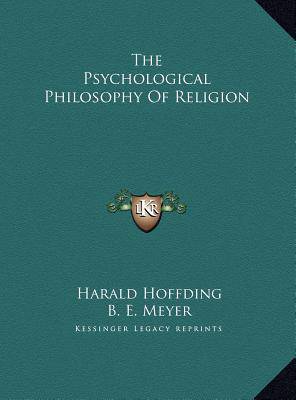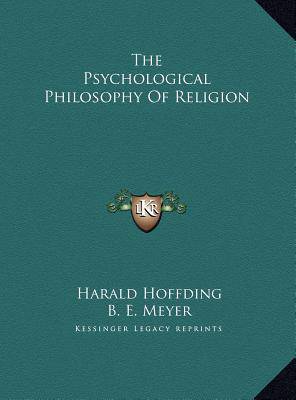
- Afhalen na 1 uur in een winkel met voorraad
- Gratis thuislevering in België vanaf € 30
- Ruim aanbod met 7 miljoen producten
- Afhalen na 1 uur in een winkel met voorraad
- Gratis thuislevering in België vanaf € 30
- Ruim aanbod met 7 miljoen producten
Zoeken
Omschrijving
The Psychological Philosophy of Religion is a book written by Harald Hoffding, a Danish philosopher and psychologist. The book explores the relationship between psychology and religion, and how the two fields intersect and influence each other. Hoffding argues that religion is a psychological phenomenon, and that understanding the psychology of religion is crucial to understanding the nature of religious experiences and beliefs. The book is divided into three parts. In the first part, Hoffding examines the psychological aspects of religious experience, including the role of emotion, imagination, and symbolism in religious belief and practice. He also explores the psychological origins of religious beliefs, and the ways in which these beliefs are shaped by cultural and social factors. In the second part of the book, Hoffding considers the philosophical implications of the psychology of religion. He argues that religious beliefs are not necessarily irrational or unscientific, but rather reflect a different way of understanding the world. He also explores the relationship between religion and morality, and the ways in which religious beliefs can influence ethical behavior. In the third and final part of the book, Hoffding considers the practical implications of the psychology of religion. He explores the ways in which religious beliefs can be used to promote psychological well-being and personal growth, and the ways in which religion can be a source of comfort and support in times of crisis. Overall, The Psychological Philosophy of Religion is a comprehensive exploration of the relationship between psychology and religion, and provides valuable insights into the nature of religious experience and belief.THIS 234 PAGE ARTICLE WAS EXTRACTED FROM THE BOOK: The Philosophy of Religion, by Harald Hoffding. To purchase the entire book, please order ISBN 0766163415.This scarce antiquarian book is a facsimile reprint of the old original and may contain some imperfections such as library marks and notations. Because we believe this work is culturally important, we have made it available as part of our commitment for protecting, preserving, and promoting the world's literature in affordable, high quality, modern editions, that are true to their original work.
Specificaties
Betrokkenen
- Auteur(s):
- Vertaler(s):
- Uitgeverij:
Inhoud
- Aantal bladzijden:
- 234
- Taal:
- Engels
Eigenschappen
- Productcode (EAN):
- 9781169743113
- Verschijningsdatum:
- 10/09/2010
- Uitvoering:
- Hardcover
- Formaat:
- Genaaid
- Afmetingen:
- 216 mm x 279 mm
- Gewicht:
- 830 g

Alleen bij Standaard Boekhandel
+ 116 punten op je klantenkaart van Standaard Boekhandel
Beoordelingen
We publiceren alleen reviews die voldoen aan de voorwaarden voor reviews. Bekijk onze voorwaarden voor reviews.











